While the main focus of the upcoming elections is the presidential contest between Claudia Sheinbaum, Xóchitl Gálvez and Jorge Álvarez Máynez, Mexicans will in fact elect around 20,000 federal, state and municipal representatives on June 2.
In eight states, citizens will elect new governors to serve six-year terms that will conclude in 2030.
Two alliances are backing candidates in most of Mexico’s governors’ elections, while the Citizens Movement (MC) party is also fielding candidates.
One alliance is Sigamos Haciendo Historia (Let’s Keep Making History), made up of the Morena party, the Labor Party (PT) and the Ecological Green Party of Mexico (PVEM).
The other is Fuerza y Corazón por México (Strength and Heart for Mexico), made up of the National Action Party (PAN), the Institutional Revolutionary Party (PRI) and the Democratic Revolution Party (PRD).
Of the eight states where citizens will elect new governors this year, Morena — the party founded by President Andrés Manuel López Obrador — currently governs five, the PAN is in office in two and MC holds one.
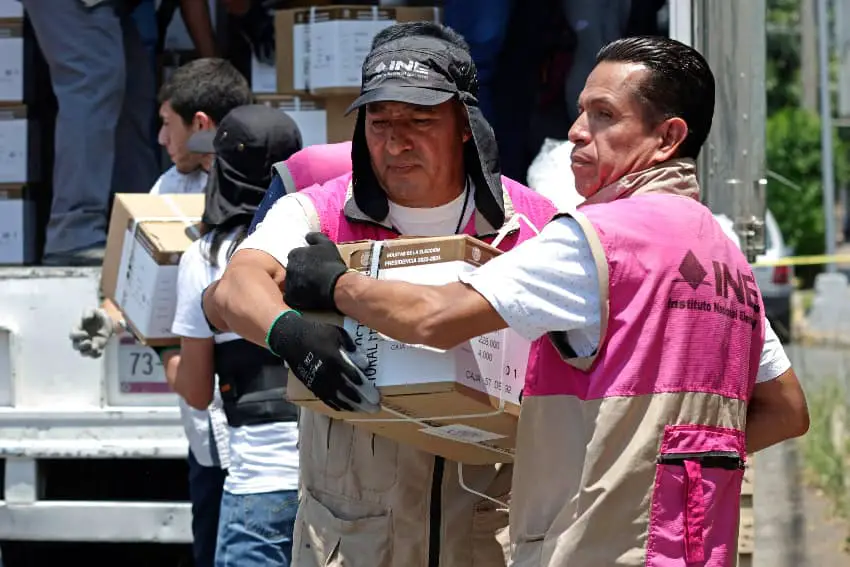
Here’s a guide to Mexico’s governors’ elections in four of the eight states where new governors will be elected on June 2.
A guide to the contests in the four other states was published on Mexico News Daily last week.
Puebla
- Population: 6.6 million
- Capital: Puebla
- Current governor: Sergio Salomón Cespedes (Morena)
Three men are aiming to become the next governor of Puebla, which has been governed by Morena since 2019.
Two recent governors died in office. Miguel Barbosa, who took office for Morena in 2019, passed away after suffering a heart attack in December 2022.
Martha Érika Alonso was killed in a helicopter accident on Christmas Eve 2018 just 10 days after she was sworn in as governor. Her husband, former governor Rafael Moreno Valle, was also killed in the crash.
In 2023, Puebla was the 13th most violent state in Mexico in terms of total homicides with a total of 967 murders, according to federal government data. The theft of fuel from pipelines is a significant problem in the state.
Alejandro Armenta Mier (Morena-PT-PVEM)
Armenta, a former state and federal lawmaker and minister for social development in the Puebla government in the mid 2000s, was formerly affiliated with the PRI. He joined Morena in 2017 and went on to represent that party in the Senate.
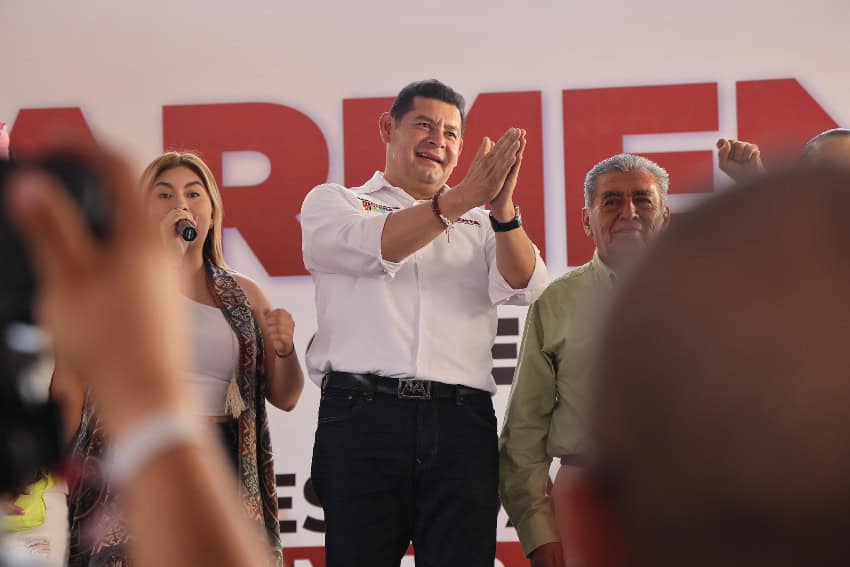
A native of the city of Izucár de Matamoros, Armenta was Senate president for 12 months between September 2022 and August 2023. He has undergraduate and master’s degrees in public administration.
🌐📱(Social media monitor): In a recent post to his X account, Armenta declared that “supporting micro, small and medium-sized businesses” will be “fundamental” for a government he leads because “they provide 80% of the jobs in the country.”
In another post, he asserted that “without women nothing” is possible, while “with women everything” is.
“… It’s the time for women and the best example we have is Dr. Claudia Sheinbaum, the next president of Mexico. We’re going to make the most of her experience to connect Puebla to the Interoceanic Train,” Armenta wrote, referring to the modernized railroad between the Pacific coast in Oaxaca and the Gulf coast in Veracruz.”
“We’re going to get on the train of transformation!” he added
Eduardo Rivera Pérez (PAN-PRI-PRD)
Rivera was mayor of Puebla until last December when he gave up that position to turn his attention to the June 2 gubernatorial election. The México state native also served as mayor of the state capital between 2011 and 2014. Before that he was a federal and state deputy.
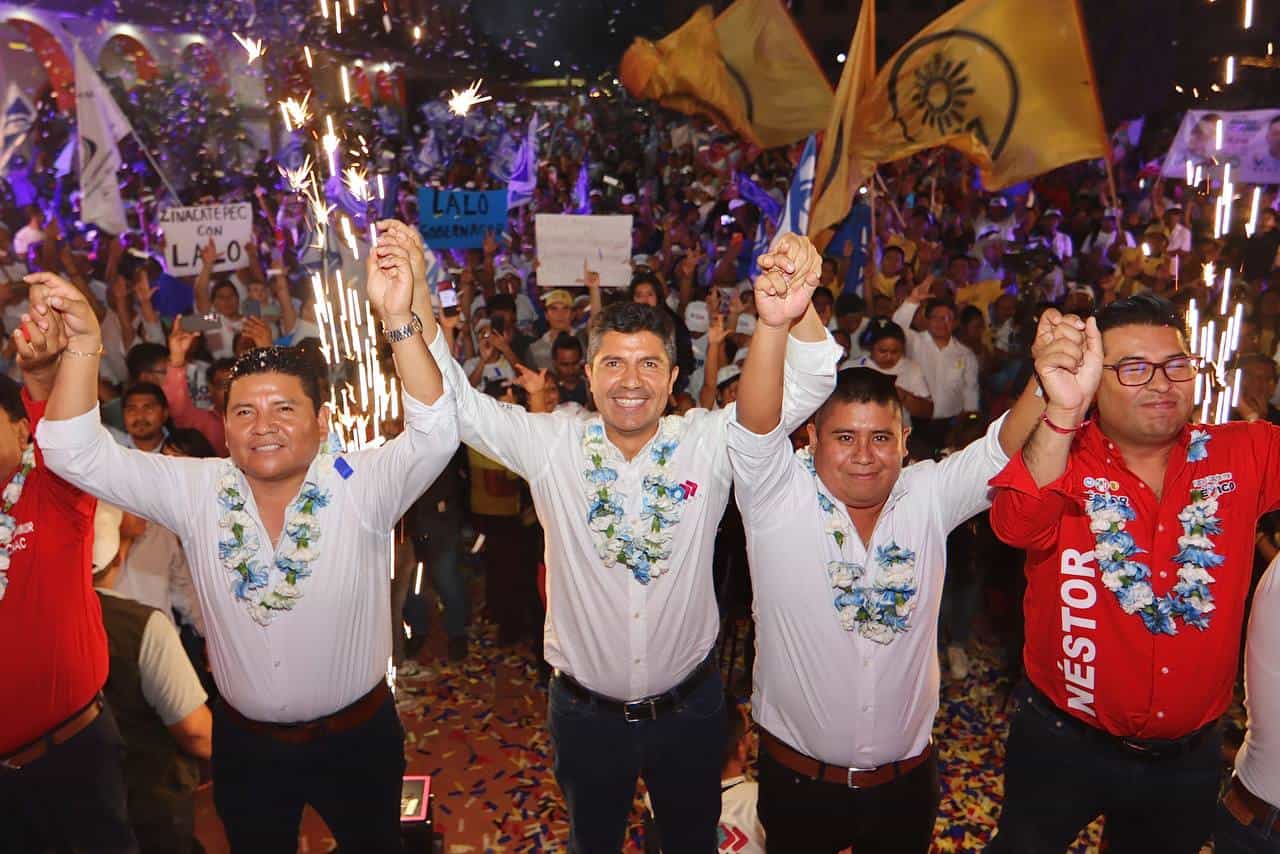
The 52-year-old has a political science degree and a master’s in public management.
🌐📱: “In my government, with the creation of the Ministry for Water and the Environment, we will guarantee equitable access to water, end the waste [of water], promote the capture of rainwater, strengthen infrastructure and promote a culture of care for the environment,” Rivera said in a post to his X account of Tuesday.
In a post on Monday, he said that a government he leads would offer more than 6 billion pesos (US $356 million) in interest-free loans to people seeking to open a new business or grow an existing one.
Fernando Morales Martínez (Citizens Movement)
Morales is the son of former Puebla governor Melquíades Morales Flores, who governed the state for the PRI between 1999 and 2005.
The candidate was formerly affiliated with the same party, which he represented in the Puebla and federal Congresses. He switched his allegiance to MC in 2017 and went on to represent that party in the Puebla Congress.
Morales has a law degree and postgraduate qualifications in public administration and Latin American studies.
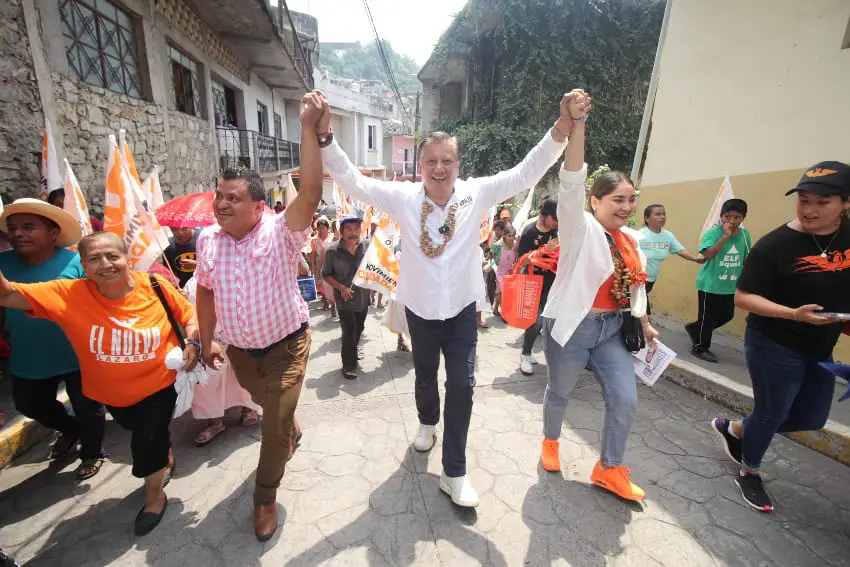
🌐📱: “Wellbeing, tranquility and peace will be a reality for every family in Puebla in my government,” the MC candidate wrote in a post to his X account on Monday.
He noted in the same post that he had just signed a “Commitment for Peace,” which his two rivals also endorsed.
In another recent post to X, Morales said that “families who have lost a loved one without knowing anything about him or her should have the complete support of the government in their search.”
Who’s going to win?
Armenta has a healthy lead over Rivera in the polls and barring a significant upset will win the June 2 election.
This week’s update to the “poll of polls” published on the Expansión Política news website shows the Morena candidate has 56% support, ahead of Rivera on 37% and Morales on 4%.
On June 2, voters in Puebla will also elect 41 state deputies and officials including mayors in all 217 municipalities.
Tabasco
- Population: 2.4 million.
- Capital: Villahermosa
- Current governor: Carlos Manuel Merino Campos (Morena)
Tabasco, the Gulf coast state where President López Obrador was born in 1953, has been governed by Morena since Jan. 1, 2019 after Adán Augusto López Hernández won the 2018 gubernatorial election. López gave up the governorship in 2021 to become federal interior minister, handing the reins of Tabasco to Carlos Manuel Merino Campos.
Four candidates are competing to succeed Merino and become governor of Tabasco, a state that has received significant investment during López Obrador’s administration due to the construction of infrastructure projects including the Olmeca Refinery and the Maya Train railroad.
Javier May Rodríguez (Morena-PT-PVEM)
May served as welfare minister in the current federal government for around 16 months before taking up the position of director general of the National Tourism Promotion Fund, the agency that is managing the Maya Train project. He previously served as a federal senator and a deputy in Tabasco, the state where he was born in 1966.
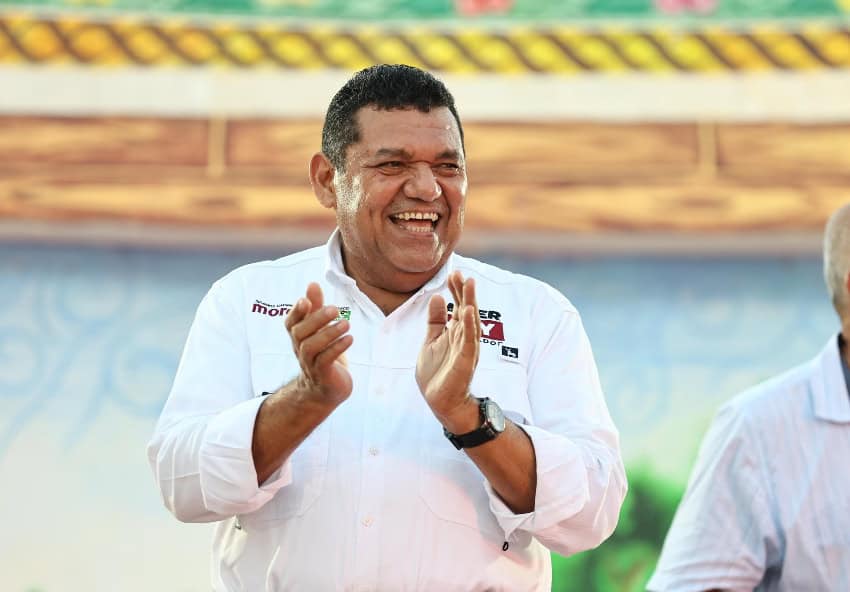
May has had a long affiliation with López Obrador, participating in the current president’s campaign when he ran for governor of Tabasco in 1994. Like AMLO, the candidate was formerly affiliated with the PRD. He joined Morena in 2015.
🌐📱: “We’re going to modernize Tabasco … with great projects that will change the history of our entity,” May said in a recent post to his X account in which he pledged to build 20,000 public housing dwellings and new port facilities in Frontera, a town on the coast of the municipality of Centla.
“We’re going to look after and continue the legacy the president leaves us,” the candidate said in another post, echoing Claudia Sheinbaum’s pitch to voters.
“The people will prevent the return of the bad PRI, PAN and PRD governments,” May added.
Lorena Beaurregard de los Santos (PAN-PRI)
Beaurregard served as a federal deputy in the early 2000s and a state deputy between 2010 and 2012. She was born in the same municipality as López Obrador – Macuspana – but nine years after the president. Beaurregard has long been affiliated with the PRI, and will represent that party and the PAN in the upcoming gubernatorial election.
🌐📱: “I’m the candidate who has risen the most in the polls,” the candidate declared in a post to her X account on Tuesday.
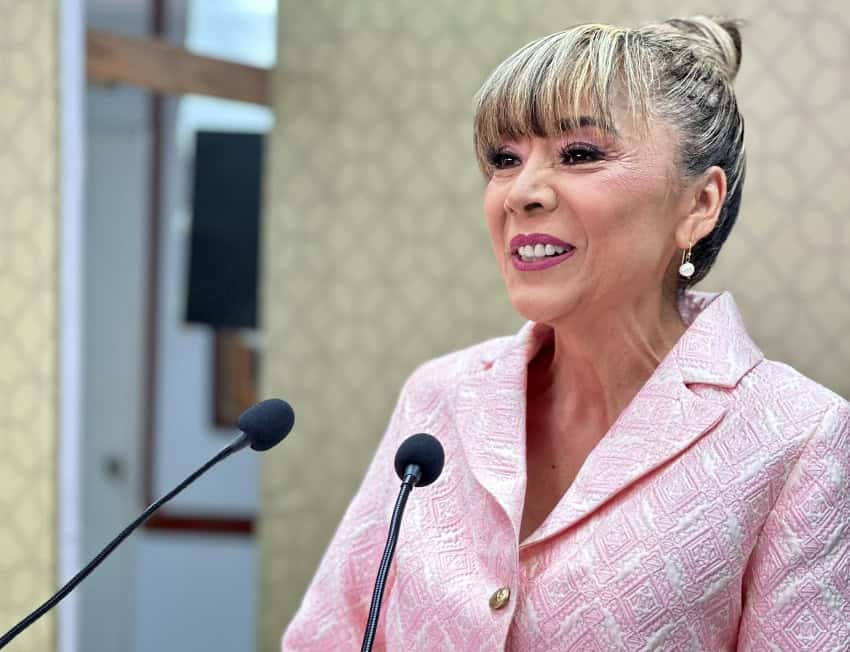
“We’ve achieved it with the support of the parties of the Strength and Heart for Tabasco coalition, but also because of the affection of many citizens who are fed up with backwardness and poverty, unemployment and insecurity,” she wrote.
“I want to be your governor because I know we can change the course of #Tabasco!” Beaurregard said in another post.
Juan Manuel Fócil Pérez (PRD)
Fócil took leave as a federal senator to contest the gubernatorial election as the candidate for the PRD. Unlike in most other states, the PRD is fielding its own candidate in the gubernatorial contest in Tabasco, opting against joining forces with the PAN and the PRI. Fócil has previously served as a federal and state deputy. He has a bachelor’s degree in economics.
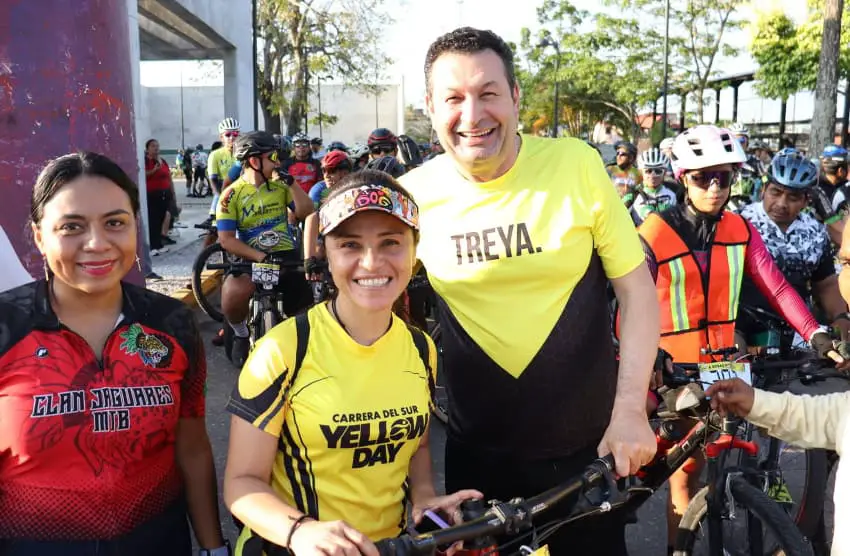
🌐📱: In a post to his Facebook page this week, Fócil said that he believes that “a government must be permanently accountable” to citizens by constantly updating them on things such as how public money is being spent.
“I assure you that when I am governor I will keep you permanently informed about what the money of Tabasco residents is spent on,” he said after blasting the current state government for failing to build health care, highway and educational infrastructure.
María Inés de la Fuente Dagdug (Citizens Movement)
De la Fuente was head of the Tabasco Civil Registry for several years in the first decade of the 2000s and served as honorary president of the DIF family services agency in Huimanguillo between 2010 and 2012 when her husband was mayor of that municipality. She was previously affiliated with the PRI and represented that party at the 2018 mayoral election in Huimanguillo.
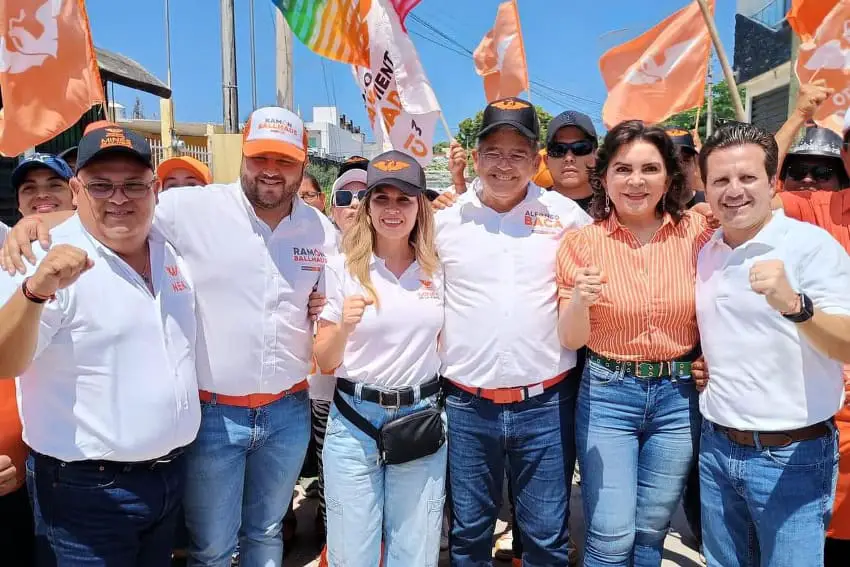
The candidate has an undergraduate degree in law and a master’s in management and public policy.
🌐📱: In a post to her Facebook page this week, de la Fuente said that a government she leads would build three new industrial parks, “creating at least 5,000 jobs” and a “housing construction boom” in the areas of Tabasco where they will be located.
She also pledged to attract advanced manufacturers to the state and to work toward making Tabasco “a great logistics and distribution center.”
In the same post, the MC candidate promised to decrease levels of informal employment and increase the number of people in formal sector jobs in Tabasco.
Who’s going to win?
May has a decisive advantage in the polls, making him the heavy favorite to become the next governor of Tabasco.
On June 2, voters in Tabasco will also elect 35 state deputies and officials including mayors in all 17 municipalities.
Veracruz
- Population: 8.1 million.
- Capital: Xalapa
- Current governor: Cuitláhuac García (Morena)
Veracruz is unique in Mexico insofar as it is the only state in the country that adjoins a northern border state (Tamaulipas) and a southern border state (two, in fact – Chiapas and Tabasco). The Gulf state was ruled by the PRI for decades before the PAN seized power in 2016 after the corruption-plagued term of former governor Javier Duarte. The Veracruz government changed again in 2018 after Cuitláhuac García won the gubernatorial election that year for Morena.
Three candidates are vying to become the next governor of the state, Mexico’s fourth most populous entity after México state, Mexico City and Jalisco.
Rocío Nahle García (Morena-PT-PVEM)
Nahle, a 60-year-old Zacatecas native, served as energy minister in the current federal government for almost five years before leaving that position to focus on the gubernatorial election. A chemical engineer by profession, the Morena candidate worked at Pemex early in her career, while she was a senator for a brief period before taking up the energy minister position. Nahle has also served as a federal deputy.
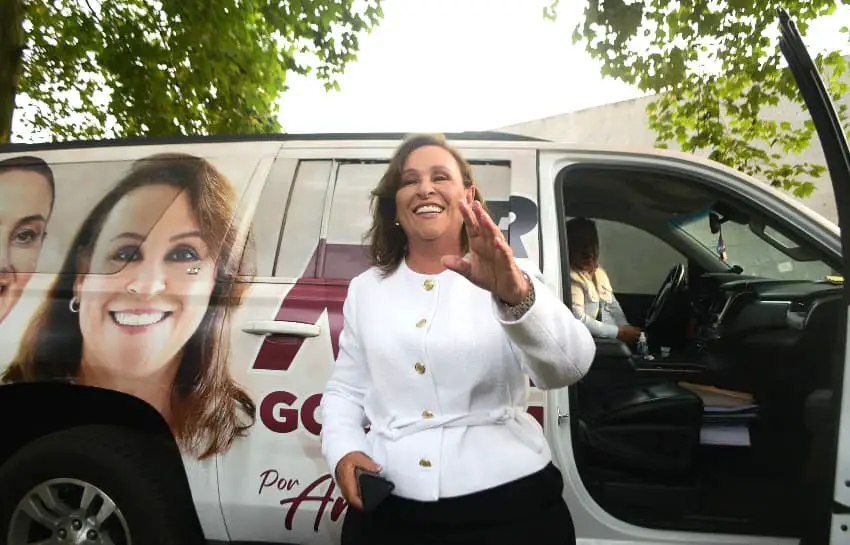
🌐📱: On her X account, the Morena candidate has pledged to provide ample support for Veracruz’s agricultural sector, including apiarists and coffee producers.
“Veracuz produces the best coffee in the world, and our countryside, as well as its producers will have THE COMPLETE SUPPORT OF MY GOVERNMENT,” Nahle said in a post this week.
In another post, she pledged to make Veracruz a “fashionable” tourism destination once again before asserting that previous government’s “destroyed” the state’s tourism industry.
Tourism is Veracruz’s “main vocation,” Nahle said, adding that the 4T, or fourth transformation – the nickname for the Morena party and its political project – will “trigger” economic growth in “every region” of the state.
José Francisco Yunes Zorrilla (PAN-PRI-PRD)
Yunes, a former federal deputy and senator, also contested the 2018 gubernatorial election in Veracruz, attracting 14% of the vote to finish third. At that election, he represented the PRI whereas in 2024 he will also have the support of the PAN and the PRD.
A native of the city Perote, Yunes served as mayor of that municipality between 1998 and 2000. The candidate has also served as a state deputy. He has an undergraduate degree in management and a master’s in public policy.
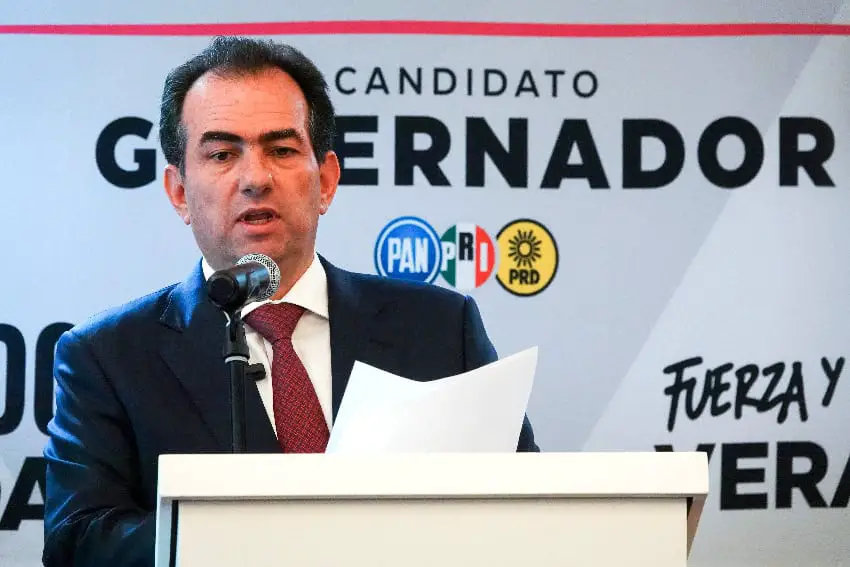
🌐📱: “The proposals we have for young people come from young people themselves,” Yunes said in a post to his X account this week.
“I understand their fears, listen to their ambitions and know about their concerns. I will use all my experience to change the course of Veracruz so that you can take advantage,” he added.
In another post, the PAN-PRI-PRD candidate pledged to create a “specialized” police unit to combat extortion, a major problem for business owners in various parts of Mexico.
Hipólito Deschamps (Citizens Movement)
Previously affiliated with the PAN, Deschamps served as a state deputy in Veracruz between 2016 and 2018. He also has experience as a councilor in the municipality of Boca del Río, where he served as the local government’s director of economic development for a period. Polo Deschamps, as he is commonly known, is 41 years old and has a law degree.
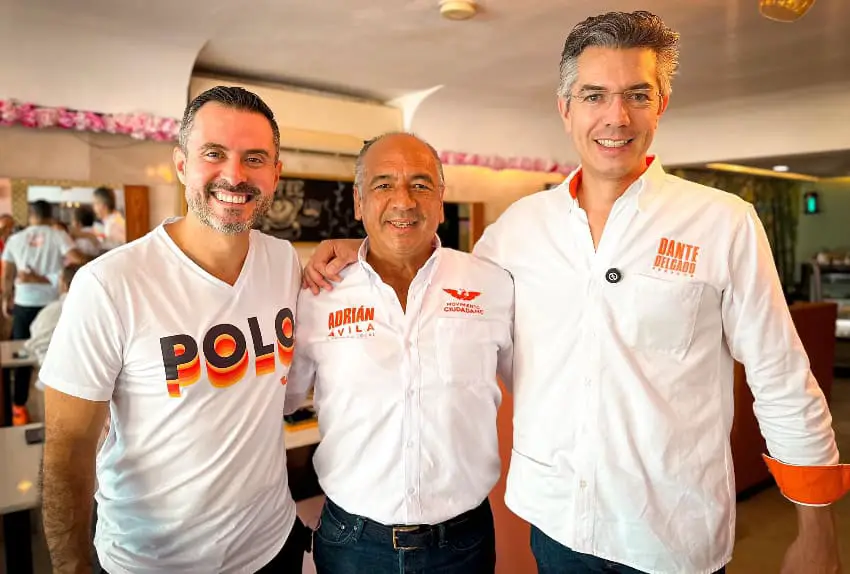
🌐📱: “Veracruz, you deserve a new quality of life,” the MC candidate said in a post to his X account on Thursday.
“As governor I will guarantee universal access to health care, support culture and invest in your education,” he added.
In another post, Deschamps pledged to provide 50,000-peso (US $3,000) loans to female entrepreneurs.
“Let’s go for the best Veracruz in history!” he added.
Who’s going to win?
Polls indicate that Nahle will be very hard to beat in Veracruz.
An El Financiero newspaper poll whose results were published in late April found that the former energy minister had 44% support, ahead of Yunes on 29% and Deschamps on 3%. Stripping out the 24% of undecided respondents, support for Nahle increased to 58%, putting her 20 points ahead of the PAN-PRI-PRD candidate.
Voters in Veracruz will also elect 50 state deputies on June 2.
Yucatán
- Population: 2.3 million
- Capital: Mérida
- Current governor: Mauricio Vila (National Action Party) – currently on leave as he campaigns for a seat in the federal Senate.
Occupying the northwestern portion of the Yucatán Peninsula, the state of Yucatán is Mexico’s least violent in terms of total homicides. But Yucatán is not without problems, one of which is its high suicide rate.
The state was governed by the PRI for most of the 20th century, but it has had two PAN governors, and two PRI governors, this century.
Four candidates are competing to become the next governor of Yucatán, which during two periods in the 19th century was an independent republic.
Renán Barrera Concha (PAN-PRI)
Barrera is aiming to follow in the footsteps of Mauricio Vila by transitioning from the mayorship of Mérida to the governorship of Yucatán. The 45-year-old candidate was mayor of the state capital from 2018 until last November, when he stood down to focus on the upcoming gubernatorial contest. Barrera also served as Mérida mayor between 2012 and 2015 and was a state deputy from 2010 to 2012. He has a law degree and a postgraduate qualification in public administration.
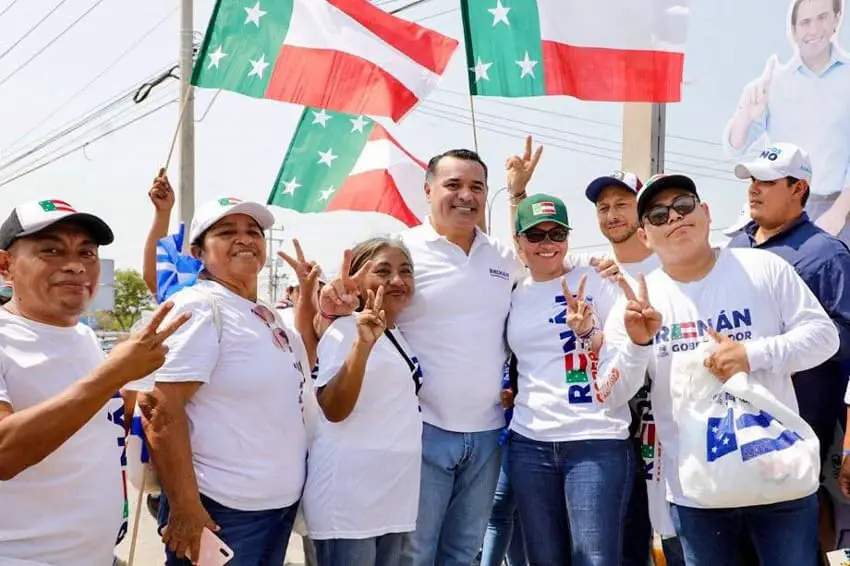
🌐📱: After visiting a textiles factory in the municipality of Baca this week, Barrera said in a post to his X account that a government he leads will provide ample support for the textiles industry “because thousands of Yucatán families live from this important sector and we want them to do well, to have more security and a better quality of life.”
“In my government we will work very closely with the Yucatán Human Rights Commission to promote, respect and also guarantee … human rights in Yucatán,” he said in another post.
Joaquín Díaz Mena (Morena-PT-PVEM)
Known as “Huacho,” Díaz was the federal government’s “super-delegate” in Yucatán for almost five years, a position that gave him responsibility for the implementation of social and welfare programs in the state.
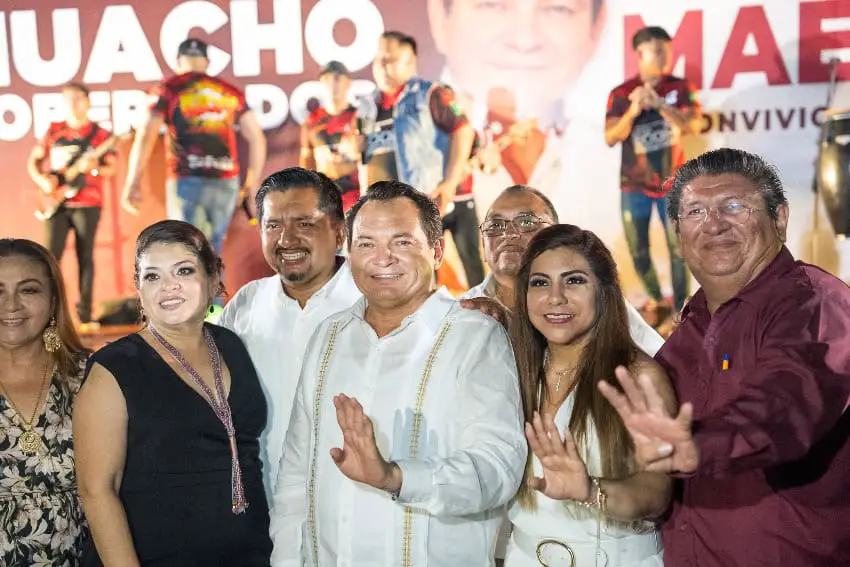
He previously served as a federal and state deputy and was Morena’s gubernatorial candidate at the 2018 election in Yucatán. Díaz also contested the 2012 gubernatorial election in Yucatán, representing the PAN, with which he was previously affiliated.
A native of San Felipe on Yucatán’s Gulf coast, the Morena candidate was mayor of that municipality between 2001 and 2004.
🌐📱: “In Morena, our premise is clear: we create humanist governments, we govern with values that prioritize respect, inclusion and equality for all citizens,” Díaz said in a post to his X account this week.
“Yucatán is ready to transform itself,” he said in another post. “Hand in hand with Claudia Sheinbaum, we will boost investment and development in Yucatán so that wellbeing reaches all families and municipalities.”
Jasmín López Manrique (PRD)
Also known by the stage name Tina Tuyub, López has been an actress for some 50 years, appearing mainly in theatrical productions. She has previously represented the PRD at the 2018 mayoral election in Mérida and the 2006 federal lower house election. The Mérida native is 66 and and was married to well-known comedic actor Héctor Herrera Álvarez, who died in 2010.
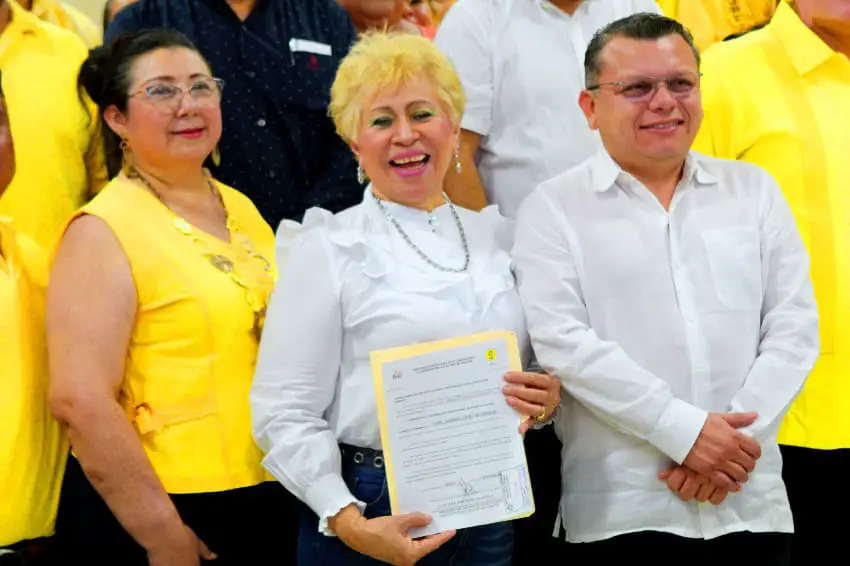
🌐📱: “Between the government and business owners, we’re going to create a new pact to boost the creation of new jobs and improve salaries,” López said in a recent post to her Instagram account.
Vida Gómez Herrera (Citizens Movement)
Formerly affiliated with the PRI, Gómez previously served as a deputy in the Yucatán state Congress and as head of the youth affairs department in the Mérida municipal government. The 36-year-old has a degree in political science and international relations. She is aiming to become the third female governor of Yucatán.
🌐📱: In a post to her X account this week, Gómez cited water, health care, transport, job creation and energy as among her priorities.
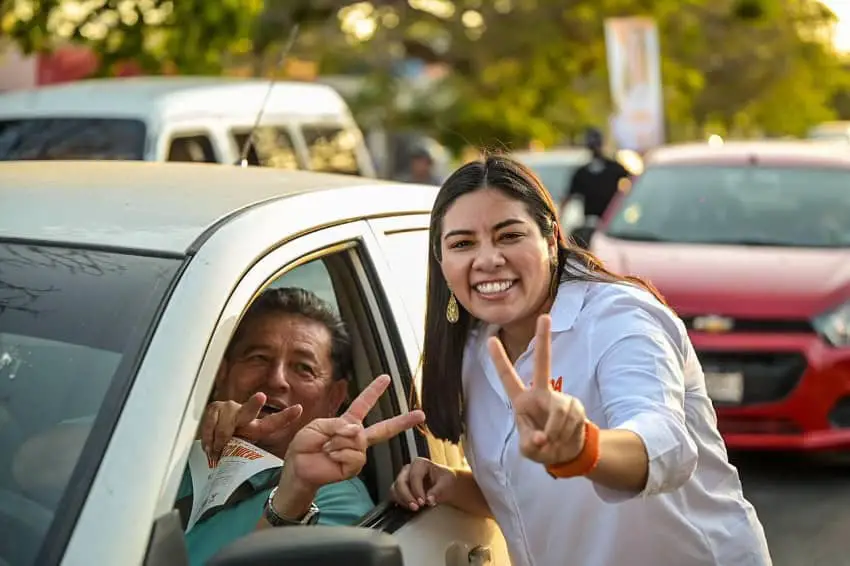
“The new Yucatán is built with the work of everyone,” she said in the same post.
The MC candidate frequently incorporates her first name — which means life — into her political messaging.
“Give vida to your vote. #VoteForVida #GovernorVida,” she wrote in one X post.
“More vida for Yucatán,” says a political ad posted to her X account.
Who’s going to win?
Polls suggest the election will be a tight contest between Barrera and Díaz.
One poll whose results were published this week shows that Díaz had a five-point lead over Barrera (46%-41%), but another shows the PAN-PRI candidate with an 11-point lead over his Morena rival (46%-35%).
The incumbency of the PAN in Yucatán and Barrera’s recent term as mayor in Mérida — the state’s largest city by far — would appear to give the PAN-PRI candidate the edge over Díaz. Barrera will most likely win on June 2.
* Another key contest on June 2 is the Mexico City mayoral election. Read about the candidates contesting that election here, and check out what the polls indicate here.
All of Mexico News Daily’s 2024 elections coverage, including numerous articles on the presidential election, can be found here.
By Mexico News Daily chief staff writer Peter Davies ([email protected])
